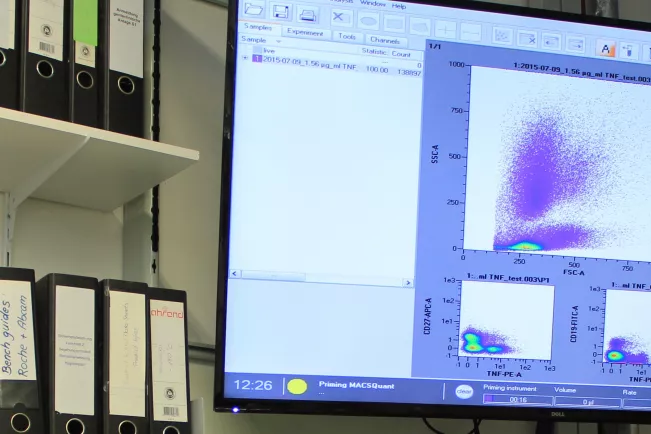Department of Natural Sciences
Immunology

Lecture
Compulsory Course
- in BSc Applied Biology, 4th Semester
- 6h/week (2L/2E/2P)
- Credits: 7 ECTS
Learning outcomes:
At the end of the study unit lecture/exercise the students are able:
- to explain the origin of immunological cells from the bone marrow and thymus
- to understand differentiation and activation of immunological cells
- to understand the reaction of the immune system to infections
Content:
- Basics of the immune system; knowledge of immunological techniques: Components of the immune system, immunological organs, structure and function of organs, cells of the immune system
- Innate immune systeme:Protective function of skin and mucosal tissues, phagocytes, complement system, natural killer cells, cytokines, chemokines, inflammatory reaction
- Adaptive immunsystem: B-cell system, ´receptors, antigen recognition, antibody production, functions of antibodies;
- T-cell-system: receptors, antigen recognition, effetor cells, mechanisms of cellular immunity; immunological memory. signal transduktion in the immune system
Exercises
The exercise serves to discuss the content of the lecture based on questions.
Both have the same content.
Internship
Learning outcomes:
At the end of the practical course the students are able:
- to work with blood cells and analyze these in blood smear
- to apply FACS technology towards the allergen specific degranulation of basophils
- to sort lymphocyte subsets via magnetic cell sorting
- to isolate immune cells from different organs and analyze them
- to test blood groups
Content:
- Magnetic sorting of cells
- Degranulation of Basophils with allergens
- Determination of blood groups, blood picture
- Flow cytometry
- Isolation of primary lymphocytes
- Determination of blood groups
Requirements
none
Recommendations: Biology 1-4; Biochemistry
Passing of module – graded
The total grade of the module is comprised of:
- a written exam about the content of the lecture and the practical course, which has to be passed with at least 50% of the total points. The grade of the exam contributes by 70% to the total grade of the module
- writing an individual laboratory report. Grading of the lab report contributes by 30% to the total grade of the module
Literature
- Immunobiology. C.A. Janeway, P. Travers, M. Walport and J.D. Capra, latest edition
Links
Further links